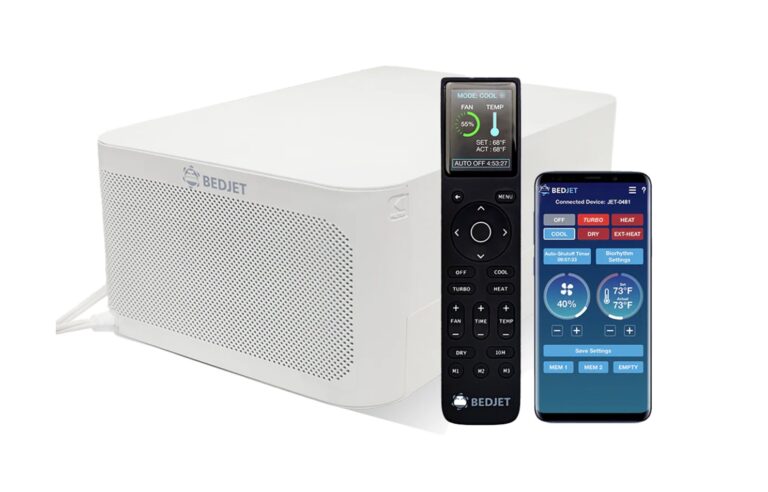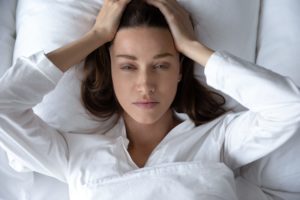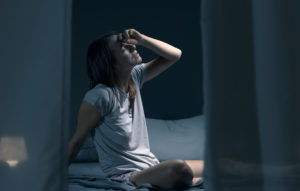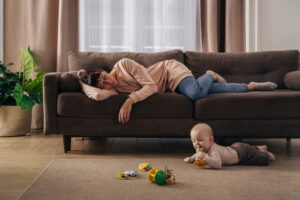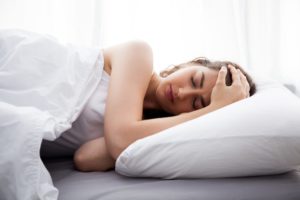When you buy through our links, we may earn a commission. Products or services may be offered by an affiliated entity. Learn more.
What Causes Night Sweats in Men?
- Night sweats are generally harmless, but excessive sweating at night can be caused by low testosterone levels, sleep apnea, stress, hormones, medications, and infections.
- If night sweats regularly interfere with your sleep, a doctor can help to diagnose and treat underlying causes.
Night sweats are an unpleasant part of life for many people. Both men and women can experience night sweats, oftentimes for similar reasons. For example, menopause is a leading cause of night sweats in women, but hormones—low testosterone, specifically—can lead to night sweats among men.
Although sweating is a normal part of the body’s temperature regulation system, night sweats go beyond a little bit of perspiration. Instead, the term refers to excessive sweating at night caused by physiological processes or underlying health conditions. Night sweats can vary in severity but are often described as severe enough to soak through bedding.
Below, we’ll explore the potential causes of night sweats among men, as well as cover tips for finding some relief and getting better sleep.
Common Causes of Night Sweats in Men
Night sweats can leave you waking up drenched and uncomfortable—but they’re not just a nuisance. In men, night sweats can stem from a wide range of causes, from harmless lifestyle factors to underlying medical conditions. Understanding what might be triggering your symptoms is the first step toward finding relief and getting better rest.
Stress and Anxiety
Anxiety makes sweat glands more responsive , and people with high stress or anxiety levels are more likely to experience night sweats. These effects are true for both short-term and chronic anxiety, with some research showing that even the stress of trying to solve a math problem can affect sweat gland responsiveness.
While women are nearly twice as likely to be diagnosed with an anxiety disorder, men are also significantly less likely to report or seek help for mental health symptoms.
The symptoms of stress can also differ between men and women, with women having more emotional responses, like sadness, and men experiencing more physical symptoms, such as changes in diastolic blood pressure. However, there are more similarities than differences between male and female responses to stress.
Sleep Apnea
Obstructive sleep apnea (OSA) is a sleep disorder that causes people to stop breathing for multiple short periods during sleep. These pauses, or apneas, are often followed by gasping or choking sounds, and severe snoring is a common symptom of OSA. An estimated 3 to 7% of Americans have OSA, but it is three to five times more common in men than in women due to differences in airway shape, obesity rates, hormones, and other factors.
Nearly a third of men with OSA report experiencing night sweats , rates which are three times higher than those seen in the general population. Successful treatment of sleep apnea appears to help resolve any related night sweats.
Acid Reflux
Acid reflux, or gastroesophageal reflux disease (GERD), occurs when stomach acid flows back into the esophagus, often causing heartburn or discomfort, especially when lying down.
For some men, acid reflux episodes at night can trigger night sweats, particularly if the reflux causes sleep disturbances or activates the body’s stress response. Eating large meals or spicy foods too close to bedtime may worsen symptoms, so making dietary and lifestyle changes can help reduce both reflux and nighttime sweating.
Medication
Some medications are known to cause excessive sweating , including night sweats. These include:
- Selective serotonin reuptake inhibitors (SSRIs) and tricyclic antidepressants
- Aspirin, ibuprofen, and other nonsteroidal anti-inflammatory drugs (NSAIDs)
- Hypoglycemic agents used for diabetes treatment
- Corticosteroids such as cortisone
If you believe a medication could be causing your night sweats, see your doctor. It is important to always speak to your doctor before stopping or lowering the dose of a medication you have been prescribed.
Infections
Infection can cause both night sweats and unusual daytime sweating. When your body is fighting off an infection, it releases inflammatory mediators that temporarily raise your thermoneutral zone. This process begins with chills and shivering that increase your core body temperature, and it is followed by excessive sweating to decrease your temperature once your thermoneutral zone returns to normal. This cycle can occur many times throughout the course of an infection.
While many minor infections can cause night sweats, they are also a symptom of serious infections like human immunodeficiency virus (HIV) , tuberculosis , endocarditis , and brucellosis .
Hyperhidrosis
Hyperhidrosis describes excessive sweating that occurs without ordinary triggers like exercise, heat, or stress. The sweating can be excessive enough to soak through clothing and can even cause skin problems due to the constant moisture it causes. Some people develop primary hyperhidrosis, also called idiopathic hyperhidrosis, that isn’t caused by underlying issues, but hyperhidrosis can also be caused by a number of health conditions and medications.
The rates of hyperhidrosis are similar for both men and women . Treatments for hyperhidrosis differ depending on the underlying cause and can include oral or topical medications, using botulinum to block neurotransmitters, and surgery.
Low Testosterone Levels
Men can experience night sweats due to low testosterone levels , also called male hypogonadism. Around 38% of men 45 years or older have low testosterone levels for a variety of reasons, and even otherwise healthy men have a 20% likelihood of having low testosterone levels if they are over 60 years old.
The causes of male hypogonadism vary dramatically but can be categorized into primary, which refers to a problem with the testicles, and secondary, which refers to a problem with the part of the brain that controls hormone production.
Other symptoms of low testosterone levels include:
- Low libido and erectile dysfunction
- Loss of body and facial hair
- Weakness and fatigue
- Lower muscle mass and increased body fat
Night sweats caused by low testosterone levels can be treated with testosterone replacement therapy or by treating the underlying cause of the low hormone levels.
Other Hormonal Issues
In addition to low testosterone levels, men can also develop night sweats due to hormonal conditions like hyperthyroidism . Also known as having an overactive thyroid, hyperthyroidism can cause excessive sweating during the day and at night. Other symptoms include fatigue, weight loss, heart palpitations, tremors, anxiety, and disturbed sleep. Treatment involves antithyroid drugs, radioactive iodine ablation, or surgery.
Adrenal disorders such as pheochromocytoma or Cushing’s syndrome may also interfere with the body’s ability to regulate stress hormones, which can trigger night sweats alongside other symptoms like high blood pressure or unexplained weight gain. Because hormone-related night sweats often occur with other signs of endocrine disruption, it’s important to consult a healthcare provider for evaluation and appropriate treatment.
Bedroom Environment
Sometimes, night sweats aren’t caused by an underlying health condition at all—they’re simply the result of a bedroom environment that’s too warm or poorly ventilated. Thick bedding, heat-retaining mattresses, flannel pajamas, or a high room temperature can all contribute to excessive nighttime sweating. In these cases, sweating is your body’s natural way of cooling down, not a sign of a medical issue.
To minimize heat buildup during sleep, try adjusting the thermostat to a cooler setting (around 60–67°F is ideal for most sleepers), choosing lightweight and breathable bedding materials like cotton or linen, and wearing moisture-wicking sleepwear. Opening a window, using a fan, or investing in a cooling mattress or pillow can also help regulate your temperature and reduce the likelihood of waking up drenched in sweat. If making these changes eases your symptoms, your environment—not your body—was likely the root of the problem.
Bedtime Habits
Certain evening routines and behaviors can inadvertently trigger night sweats. Common culprits include eating a heavy or spicy meal too close to bedtime, drinking alcohol or caffeine in the evening, or exercising late at night. These habits can raise your core body temperature or stimulate your nervous system, both of which may lead to sweating during sleep.
To help prevent night sweats caused by bedtime habits, try to eat your last meal at least 2–3 hours before bed, limit spicy or acidic foods in the evening, and opt for calming activities like reading or light stretching instead of vigorous workouts late at night. Avoiding alcohol and caffeine in the hours leading up to sleep can also make a significant difference. Small adjustments to your nightly routine can have a big impact on how comfortable—and sweat-free—your sleep becomes.
Other Causes
Night sweats are a common symptom with many potential causes. Although no relationship has been found between night sweats and the risk of death, night sweats can be a symptom of some serious conditions. These include:
- Cancer: People who have cancer sometimes experience night sweats as a side effect of either cancer itself or the treatment they are receiving. Cancer survivors may also have night sweats even once they are in remission. Treatment usually involves treating the cancer while using lifestyle changes or medication to ease discomfort associated with night sweats.
- Neurological Conditions: Some neurological conditions can cause either night sweats or hyperhidrosis during both the day and night. These include neuropathy , autonomic dysreflexia , syringomyelia , and stroke .
- Certain types of exercise: There is some evidence that regular exercise can lower the thermoneutral zone, causing people to start sweating at lower temperatures than usual. For example, eight to 14 days spent exercising in a hot environment can cause changes in your thermoneutral zone that may contribute to night sweats. While exercise is healthy, night sweats are also considered a symptom of sports overtraining, and it is important to discuss any new or concerning symptoms with your doctor.
Tips to Reduce Night Sweats
If night sweats are due to an underlying health condition, treating the condition will usually help reduce the night sweats. You can take additional measures to sleep more comfortably, including:
- Keep Cool: Although night sweats occur regardless of ambient temperature, turning on your air conditioning, buying a mattress that sleeps cool, or using breathable bedding can be more comfortable and help reduce sweating. It is also easier to get a good night’s sleep if your room is set to a comfortable temperature.
- Wear Comfortable Clothing: Loose pajamas made of a breathable, moisture-wicking fabric, like cotton, can help keep you cool while allowing sweat to evaporate more quickly.
- Use Relaxation Techniques: Since stress and anxiety can worsen night sweats, relaxation techniques may be helpful for both coping with and reducing night sweats. Meditation, mindfulness, guided imagery, and breathing exercises are all popular techniques. Working with a professional for cognitive behavioral therapy or hypnosis may also be helpful.
- Avoid Dietary Triggers: Alcohol, caffeine , and spicy foods can all affect sweating and your internal temperature. Avoiding them, particularly at night, may help reduce your night sweats.
- Maintain a Healthy Weight: Excess weight may cause night sweats in some people. Obesity is also a risk factor for other conditions that may cause night sweats, such as sleep apnea, and weight loss is sometimes recommended to treat these conditions.
When to Talk to Your Doctor
Night sweats are a common condition. However, since night sweats can be a symptom of health conditions that require treatment, your doctor is your best resource if you’re concerned. Speak to your doctor if night sweats persist or are accompanied by other signs of a health issue, including:
- Sleep disturbances
- Fatigue, weakness, or excessive daytime sleepiness
- Weight loss unrelated to lifestyle or diet changes
- Mood changes
- Fever
Even if you do not have an underlying condition causing your night sweats, you may want to speak to your doctor about treatment options if night sweats interfere with your ability to sleep comfortably.

Still have questions? Ask our community!
Join our Sleep Care Community — a trusted hub of sleep health professionals, product specialists, and people just like you. Whether you need expert sleep advice for your insomnia or you’re searching for the perfect mattress, we’ve got you covered. Get personalized guidance from the experts who know sleep best.
References
24 Sources
-
van den Broek, M. D., Bradshaw, C. M., & Szabadi, E. (1984). The effects of a psychological “stressor” and raised ambient temperature on the pharmacological responsiveness of human eccrine sweat glands: Implications for sweat gland hyper-responsiveness in anxiety states. European Journal of Clinical Pharmacology, 26(2), 209–213.
https://pubmed.ncbi.nlm.nih.gov/6723759/ -
McLean, C. P., Asnaani, A., Litz, B. T., & Hofmann, S. G. (2011). Gender differences in anxiety disorders: Prevalence, course of illness, comorbidity and burden of illness. Journal of Psychiatric Research, 45(8), 1027–1035.
https://pubmed.ncbi.nlm.nih.gov/21439576/ -
Smith, D. T., Mouzon, D. M., & Elliott, M. (2018). Reviewing the assumptions about men’s mental health: An exploration of the gender binary. American Journal of Men’s Health, 12(1), 78–89.
https://pubmed.ncbi.nlm.nih.gov/26864440/ -
Lin, C. M., Davidson, T. M., & Ancoli-Israel, S. (2008). Gender differences in obstructive sleep apnea and treatment implications. Sleep Medicine Reviews, 12(6), 481–496.
https://pubmed.ncbi.nlm.nih.gov/18951050/ -
Arnardottir, E. S., Janson, C., Bjornsdottir, E., Benediktsdottir, B., Juliusson, S., Kuna, S. T., Pack, A. I., & Gislason, T. (2013). Nocturnal sweating–A common symptom of obstructive sleep apnoea: The Icelandic sleep apnoea cohort. BMJ Open, 3(5), e002795.
https://pubmed.ncbi.nlm.nih.gov/23674447/ -
Das, S. (2020, June). Hyperhidrosis.
https://www.merckmanuals.com/professional/dermatologic-disorders/sweating-disorders/hyperhidrosis#v963302 -
Mold, J. W., Roberts, M., & Aboshady, H. M. (2004). Prevalence and predictors of night sweats, day sweats, and hot flashes in older primary care patients: An OKPRN study. Annals of Family Medicine, 2(5), 391–397.
https://pubmed.ncbi.nlm.nih.gov/15506569/ -
Johnson, M. O., Stallworth, T., & Neilands, T. B. (2003). The drugs or the disease? Causal attributions of symptoms held by HIV-positive adults on HAART. AIDS and Behavior, 7(2), 109–117.
https://pubmed.ncbi.nlm.nih.gov/14586196/ -
Sari, R., Bayindir, Y., Sevinc, A., Bahceci, F., & Ozen, S. (2002). The triad of weight loss, fever and night sweating: Isolated bone marrow tuberculosis, a case report. Journal of Chemotherapy (Florence, Italy), 14(4), 420–422.
https://pubmed.ncbi.nlm.nih.gov/12420863/ -
Shetty, A., Ribeiro, D., Evans, A., & Linnane, S. (2004). Gonococcal endocarditis: A rare complication of a common disease. Journal of Clinical Pathology, 57(7), 780–781.
https://pubmed.ncbi.nlm.nih.gov/15220379/ -
Ewals, J. A. P. M. (2005). Brucellosis as an imported disease in a young man with arthritis. Nederlands Tijdschrift Voor Geneeskunde, 149(50), 2810–2814.
https://pubmed.ncbi.nlm.nih.gov/16385835/ -
Liu, Y., Bahar, R., Kalia, S., Huang, R. Y., Phillips, A., Su, M., Yang, S., Zhang, X., Zhou, P., & Zhou, Y. (2016). Hyperhidrosis prevalence and demographical characteristics in dermatology outpatients in Shanghai and Vancouver. PloS One, 11(4), e0153719.
https://pubmed.ncbi.nlm.nih.gov/27105064/ -
Roberts, L. N., Bagot, C. N., Patel, R. K., Whitehead, M., & Arya, R. (2009). Late onset hypogonadism: An alternate cause for night sweats in the haematology clinic. British Journal of Haematology, 145(3), 435–437.
https://pubmed.ncbi.nlm.nih.gov/19222468/ -
Mulligan, T., Frick, M. F., Zuraw, Q. C., Stemhagen, A., & McWhirter, C. (2006). Prevalence of hypogonadism in males aged at least 45 years: The HIM study. International Journal of Clinical Practice, 60(7), 762–769.
https://pubmed.ncbi.nlm.nih.gov/16846397/ -
Kumar, P., Kumar, N., Thakur, D. S., & Patidar, A. (2010). Male hypogonadism: Symptoms and treatment. Journal of Advanced Pharmaceutical Technology & Research, 1(3), 297–301.
https://pubmed.ncbi.nlm.nih.gov/22247861/ -
Bryce, C. (2020). Persistent night sweats: Diagnostic evaluation. American Family Physician, 102(7), 427–433.
https://pubmed.ncbi.nlm.nih.gov/32996756/ -
De Leo, S., Lee, S. Y., & Braverman, L. E. (2016). Hyperthyroidism. Lancet (London, England), 388(10047), 906–918.
https://pubmed.ncbi.nlm.nih.gov/27038492/ -
PDQ Supportive and Palliative Care Editorial Board. (2002). Hot flashes and night sweats (PDQ®): Patient version. In PDQ Cancer Information Summaries. National Cancer Institute (US).
https://pubmed.ncbi.nlm.nih.gov/26389162/ -
Flores, S., Davis, M. D. P., Pittelkow, M. R., Sandroni, P., Weaver, A. L., & Fealey, R. D. (2015). Abnormal sweating patterns associated with itching, burning and tingling of the skin indicate possible underlying small-fibre neuropathy. The British Journal of Dermatology, 172(2), 412–418.
https://pubmed.ncbi.nlm.nih.gov/25597261/ -
Khanna, K., Theologis, A. A., & Tay, B. (2017). Autonomic dysreflexia caused by cervical stenosis. Spinal Cord Series and Cases, 3, 17102.
https://pubmed.ncbi.nlm.nih.gov/29423305/ -
Stanworth, P. A. (1982). The significance of hyperhidrosis in patients with post-traumatic syringomyelia. Paraplegia, 20(5), 282–287.
https://pubmed.ncbi.nlm.nih.gov/7177694/ -
Sakashita, Y., Kakuta, K., Kakuma, K., & Matsuda, H. (1992). [Unilateral persistent hyperhidrosis after ischemic stroke]. Rinsho Shinkeigaku = Clinical Neurology, 32(4), 454–456.
https://pubmed.ncbi.nlm.nih.gov/1395337/ -
Kazman, J. B., Attipoe, S., Kupchak, B. R., & Deuster, P. A. (2020). Caffeine and heat have additive but not interactive effects on physiologic strain: A factorial experiment. Journal of Thermal Biology, 89, 102563.
https://pubmed.ncbi.nlm.nih.gov/32364995/ -
Ludy, M-J., & Mattes, R. D. (2011). The effects of hedonically acceptable red pepper doses on thermogenesis and appetite. Physiology & Behaviors, 102(3–4), 251–258.
https://pubmed.ncbi.nlm.nih.gov/21093467/


